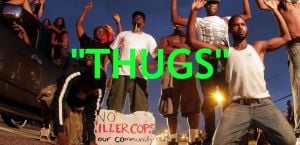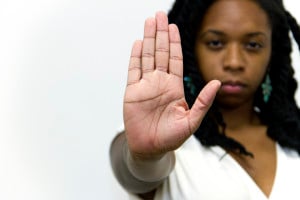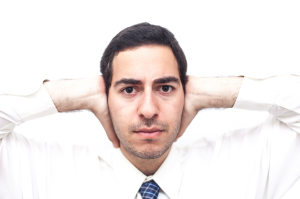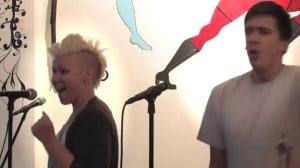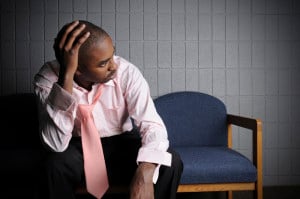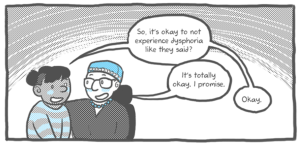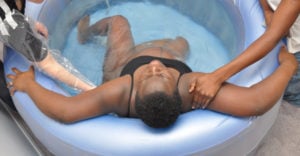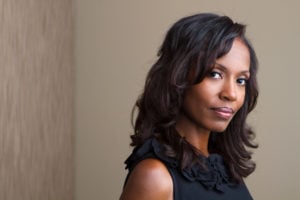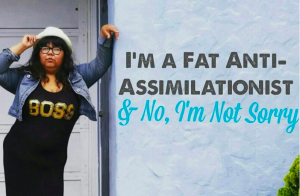Originally published on Buzzfeed Community and republished here with the author’s permission.
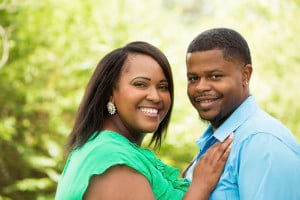
Source: iStock
To be honest, dating while fat, Black, queer, a hood feminist, and a radical activist means either compromising parts of myself, or suffering through easing partners into gradually respecting all of my humanity.
Living in a culture that defines my body as unhealthy, a problem, ugly, unhygienic, and unworthy of love makes it that much harder to find a potential partner to value all of me.
In my teens and early twenties, I’ve experienced a lot of bullshit, disappointments, almost-but-not-quite’s, and occasionally some really great partners.
Through all of the trials and tribulations, and in circumnavigating my identity, there are five primary questions I consider before committing to a potential partner.
1. Have you ever dated someone who’s fat?
This is the number one question for me, especially as a fat femme. It’s important to know if a potential partner has ever dated someone fat because it sets the tone for history of attraction and having the experience of dating someone fat. It gives me a sense of relief and safety because it can be assumed that I’m not a fat girl experiment for you.
In high school, I dated a guy who only asked me out to humiliate me in front of his friends. I’ve had men attempt to try me out because I’m a “pretty girl who’s big in all the right places” or they wanted to know what it was like to fuck a fat girl for shits and giggles.
As well, my race has always played a significant role in navigating trust of potential partners. I dated someone who told me he always wanted to date a big black girl who could put him in his place. Gross.
Racist fetishizing of fat Black girls is such a common reality that it forced me to question if a potential non-Black partner had a history of dating Black women as an additional stipulation so that I also didn’t feel like a research project, an animal, a fetish, or a place holder until someone more worthy came along.
These very dehumanizing hurtful experiences reaffirmed my distrust in anyone’s ability to love me for me, reinforcing why checking for receipts is out of respect for my wellbeing.
Although it’s not an absolute deal-breaker if someone hasn’t dated someone fat before me, it will set the tone for how much anxiety I might have in navigating being the first fat person you’ve dated.
2. Are you afraid of what people will think?
Existing while fat means navigating a world that constantly tells you you’re unworthy. That means that regardless of what we think of ourselves as fat people, we are subjected to proving our worth. We can be the most confident and secure person in the world and it will not change the fact that society will try to convince us that we should hate ourselves.
In one of my more recent relationships, a picture from my blog where I was dressed in lingerie was circulated on the internet and was turned into a meme. It was so popular that people I knew on my college campus even reposted it.
Eventually, it got back to my then girlfriend. Her first response was not to comfort me, but to be in her feelings about the fact that the world was shaming her girlfriend for being “ugly.”
Instead of trying to empathize with how much the world hates fat people, even the ones who challenge beauty standards by wearing whatever the fuck they want, she made it about a reflection of her worth and what kind of girl she would date.
Having a partner that thinks more about what your marginalization will do to them instead of what hurt you experience and live with is violence.
Understanding that having support, especially from a non-fat partner is so necessary to surviving and thriving as a fat person. Your partner(s) should provide you with safety and care, not make you feel guilty for oppressive beauty standards that you have no control over.
Flashback to another example where I was told upfront that a guy had never openly dated a fat girl and had reservations about being with me. I was convinced that I could bring him to the fat side so I kept dating him. After a month of good laughs and awesome bookstore dates, he finally broke down after trying to tolerate my body and told me he couldn’t do it.
I never cried so hard in my life. I always imagined that no one would ever really love me because I’ll never be pretty enough.
But I never heard anyone say those words out loud. “I don’t feel comfortable with how big you are and I can’t be with you.” That moment broke my heart.
It haunts me still, even when I’m in a healthy, loving relationship. But I took that experience and pain as a basis for my empowerment and journey to loving myself more than anyone ever could. I look back on that situation and know that it is a form of self-care for me to ask questions like these and gauge someone’s body and beauty politics before I consider a future with them.
3. Do you understand the difference between empowerment and fatphobia?
Often, people who say they love us just the way we are don’t always know what it means to actually respect fat folks versus enabling fatphobic thinking.
Best example: “I love a woman with meat on her bones.” This is literally the most common pick up line or words of “encouragement” from people who have been interested in me or as an attempt to flirt with me.
No one wants to hear women being stripped down to animalistic meatiness. No one wants to hear that your basis for wanting them is because you aren’t attracted to someone else. It’s a backhanded compliment at best and you’re gonna get igged if you try me like that.
Another example would be Drake’s infamous line, “I like my girls BBW.” BBW has a connotation of sexualizing, fetishizing, and racializing bigger women. This term carries a lot of one-dimensional limitation of fat bodies (especially non-white fat bodies) that carries dehumanization and violence behind it.
The term has also been reclaimed by many folks within the fat acceptance and body positivity movement, but just like the term “fat,” not everyone within our communities reclaims or fucks with certain terms. But just to reiterate, fat people are people.
Instead of finding a term to classify us as, you can just call us by our names and treat us like human beings.
Other fatphobic commentary includes:
“I love a girl who can eat.” We don’t all have large appetites because we’re fat.
“Confidence is sexy.” This is targeted to bigger folks to convince us we’re only attractive because we push back against a thin privileged society and aren’t visibly insecure the way we’re expected to be. It’s a fetishization of the resilience and lived violence we suffer daily.
“You’re pretty for a big girl.”
Stop. Playing. You know why.
Examples of empowering commentary are:
“You’re attractive.”
“You’re worthy.”
“You’re the baddest.”
“You are more than your body, but I love appreciating your beauty.”
4. Have you ever had fat sex?
This may sound like the first question but it’s brings into context physical intimacy versus just courting a fat person. Questioning if a potential partner will know how to navigate fat bodies through physical intimacy and sex is super important to me because I still carry insecurity in navigating my own body and how it moves.
This is also complicated even more so because we live within a fatphobic, sizeist society in which there is almost no positive representation of fat sex in the media to reference, learn from, or be aroused by.
So when a potential partner (fat or non-fat) hasn’t had sex with a fat person, it’s not necessarily a deal breaker but more so an understanding that I will require special attention in how we fuck since there aren’t any references.
Fat sex can be different in a good way! Actually, in a great way. Sexually active fatties have been killing the game for centuries. This isn’t a question of limitation, but more so reality of understanding how bodies can operate together better through communication and experience.
I can always back it up and throw it down, but are you aware of how much weight you can withstand in certain positions? Sitting on faces, riding penetrative devices/parts, or 69’ing are all positions to work through to determine comfortability in all relationships.
5. Are you prepared to challenge fatphobic expectations of relationships?
In almost every romantic comedy, we always see the cisnormative stereotypical handsome dude pick up the cisnormative beauty standard acceptable thin girl and spin her in the air before plopping a big climatic kiss on her!
But that’s not a regular reality for fat relationships. I say that not because someone could never lift up their fat partner, but because it’s really fucking hard to lift someone up let alone someone that may be significantly larger than you for some false romantic fantasy.
As mentioned earlier, there are limited forms of representations of fat love, fat sex, or fat existence within media. So there’s no (healthy) relationships to reference for a potential partner to know what to expect in dating someone fat in a sizeist world.
So to keep it 100, we’re probably not gonna do that cute piggy back thing couples do in movies. You’re not going to pick me up and carry me in your arms if I fall and hurt my ankle during a zombie apocalypse.
Things my current partner (who is non-fat) has to think about are the sizing of seats in restaurants or stadiums, how I can’t wear his clothes, activities we do (no roller coasters with seatbelts for me!), how we travel (bus, train, or airplane, what kind of bed we get, etc).
These are all things most folks wouldn’t think about before dating a fat person, but it matters.
I’m really not going to sit in a tight booth if the table doesn’t move to adjust for my belly. I’m unapologetically transparent about my needs and accommodations to the sizeist standards in our culture.
But not every fat person is okay with announcing that they need more space, or a different activity that may be better suited for their comfort. So it’s important for potential partners to recognize these realities.
These questions are necessary for me to ask out of self-care. At this point in my life, and at this point in my consciousness of what culture, society, and the world thinks about my body, I’m beyond giving more latitude to other people than I am for myself. I deserve to know what level of respect someone is able to give to me before I decide to invest in them.
My body and identity aren’t a learning lesson.
And as a fat Black queer femme trying to survive, I’m not willing to suffer through a relationship with someone who might be detrimental to my mental health and survival.
Fat Black girls like me aren’t asking for too much, we just want to be fully and radically loved.
[do_widget id=’text-101′]
Ashleigh Shackelford is a radical, queer, Black fat femme cultural artist and writer located in Richmond, VA. Ashleigh is a pop-culture enthusiast, community organizer at Black Action Now, and the founder of a body+ org. Free Figure.
Search our 3000+ articles!
Read our articles about:
Our online racial justice training
Used by hundreds of universities, non-profits, and businesses.
Click to learn more
Most Read Articles
- « Previous
- 1
- …
- 30
- 31
- 32





